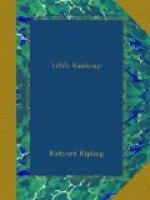And these men His Highness rules by the only weapon that they understand—the fear of death, which among some Orientals is the beginning of wisdom. Some say that the Amir’s authority reaches no farther than a rifle bullet can range; but as none are quite certain when their king may be in their midst, and as he alone holds every one of the threads of Government, his respect is increased among men. Gholam Hyder, the Commander-in-chief of the Afghan army, is feared reasonably, for he can impale; all Kabul city fears the Governor of Kabul, who has power of life and death through all the wards; but the Amir of Afghanistan, though outlying tribes pretend otherwise when his back is turned, is dreaded beyond chief and governor together. His word is red law; by the gust of his passion falls the leaf of man’s life, and his favour is terrible. He has suffered many things, and been a hunted fugitive before he came to the throne, and he understands all the classes of his people. By the custom of the East any man or woman having a complaint to make, or an enemy against whom to be avenged, has the right of speaking face to face with the king at the daily public audience. This is personal government, as it was in the days of Harun al Raschid of blessed memory, whose times exist still and will exist long after the English have passed away.
The privilege of open speech is of course exercised at certain personal risk. The king may be pleased, and raise the speaker to honour for that very bluntness of speech which three minutes later brings a too imitative petitioner to the edge of the ever ready blade. And the people love to have it so, for it is their right.
It happened upon a day in Kabul that the Amir chose to do his day’s work in the Baber Gardens, which lie a short distance from the city of Kabul. A light table stood before him, and round the table in the open air were grouped generals and finance ministers according to their degree. The Court and the long tail of feudal chiefs—men of blood, fed and cowed by blood—stood in an irregular semicircle round the table, and the wind from the Kabul orchards blew among them. All day long sweating couriers dashed in with letters from the outlying districts with rumours of rebellion, intrigue, famine, failure of payments, or announcements of treasure on the road; and all day long the Amir would read the dockets, and pass such of these as were less private to the officials whom they directly concerned, or call up a waiting chief for a word of explanation. It is well to speak clearly to the ruler of Afghanistan. Then the grim head, under the black astrachan cap with the diamond star in front, would nod gravely, and that chief would return to his fellows. Once that afternoon a woman clamoured for divorce against her husband, who was bald, and the Amir, hearing both sides of the case, bade her pour curds over the bare scalp, and lick them off, that the hair might grown again, and she be contented. Here the Court laughed, and the woman withdrew, cursing her king under her breath.




